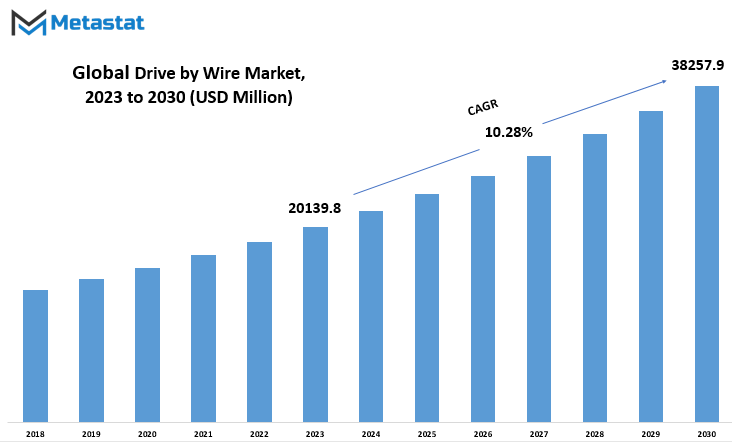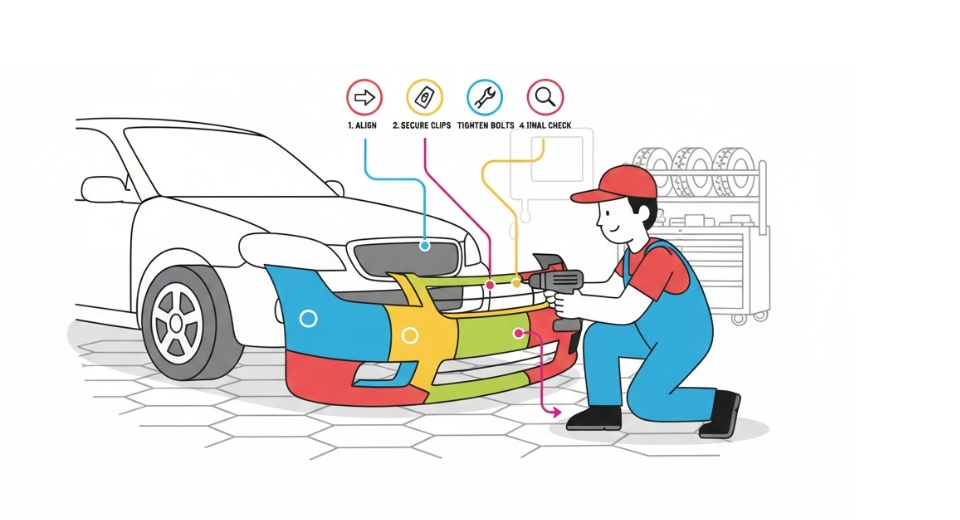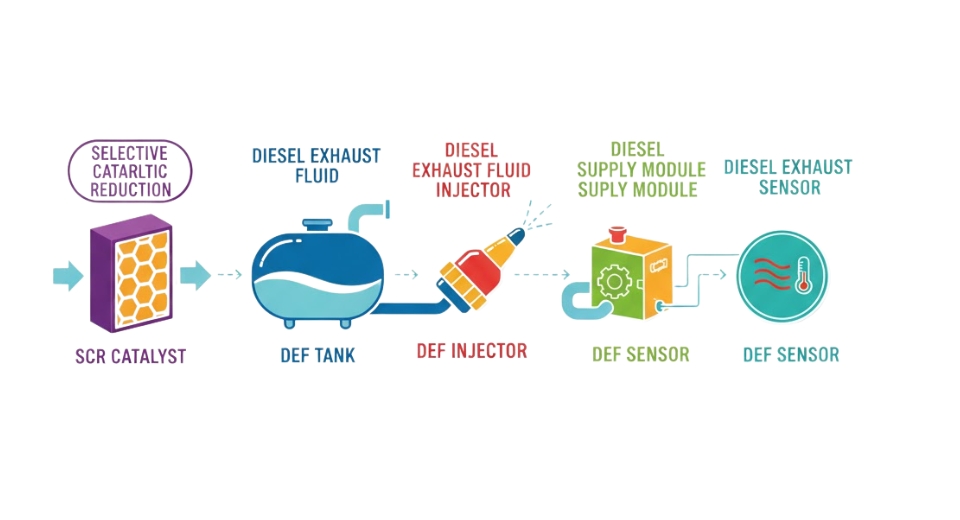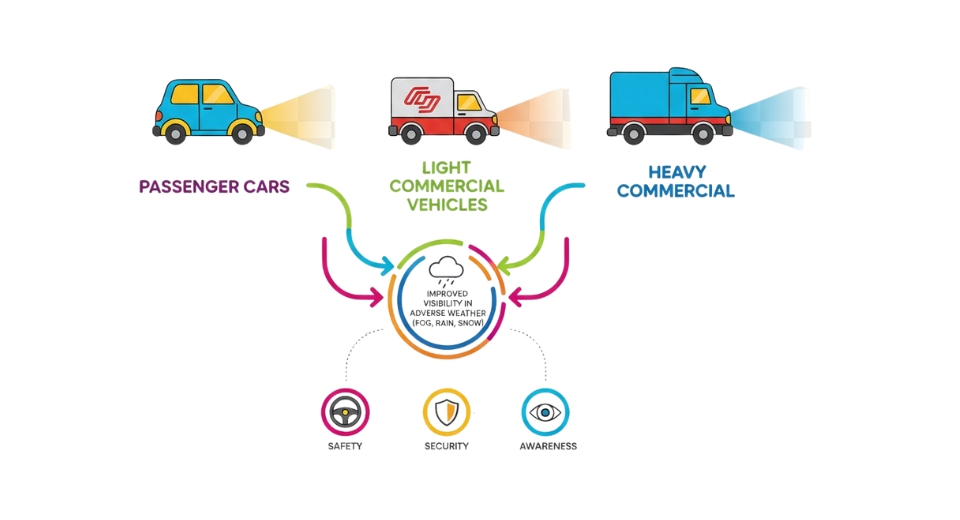MARKET OVERVIEW
The Global Drive-by-Wire market stands as a technological beacon in the automotive industry, revolutionizing the way vehicles are controlled and maneuvered. At its core, the drive-by-wire system eliminates traditional mechanical linkages between the driver’s input and the vehicle’s response, ushering in an era of electronic precision and enhanced safety.
In essence, drive-by-wire replaces conventional components like the throttle, brake, and steering systems with electronic counterparts, allowing for seamless communication between the driver and the vehicle’s control unit. This transformative technology not only redefines the driving experience but also plays a crucial role in the ongoing evolution of autonomous and electric vehicles.
One of the primary driving factors behind the increasing adoption of drive-by-wire systems is the quest for improved fuel efficiency and reduced emissions. By eliminating the need for bulky mechanical components, these systems contribute to lightweight vehicle designs, positively impacting fuel consumption and environmental sustainability.
In the automotive landscape, safety is paramount, and drive-by-wire technology addresses this concern with its inherent safety features. The system enables the implementation of advanced driver-assistance systems (ADAS), such as electronic stability control and adaptive cruise control, enhancing vehicle safety and reducing the likelihood of accidents.
Furthermore, the Global Drive-by-Wire market is not confined to passenger vehicles alone. Commercial and industrial sectors are also leveraging this technology to enhance the performance and efficiency of various vehicles, ranging from trucks and buses to heavy-duty equipment. The adaptability of drive-by-wire systems across diverse applications underscores its versatility and potential to shape the future of transportation.
As the automotive industry continues its relentless pursuit of innovation, the Global Drive-by-Wire market emerges as a key enabler of progress. With ongoing research and development, this technology is poised to overcome current challenges and push the boundaries of what is achievable in vehicle control systems. The journey towards a more connected, efficient, and safer automotive future is unmistakably steered by the transformative capabilities of drive-by-wire technology.
Global Drive by Wire market is estimated to reach $38257.9 Million by 2030; growing at a CAGR of 10.28% from 2023 to 2030.

GROWTH FACTORS
The Global Drive-by-Wire market experiences significant growth fueled by key driving factors. These factors, instrumental in propelling the market forward, contribute to its upward trajectory. Simultaneously, challenges exist that could potentially impede this growth.
One crucial driving factor is the relentless advancement in automotive technology. As vehicles evolve into more sophisticated entities, the demand for drive-by-wire systems rises. These systems, which replace traditional mechanical linkages with electronic controls, enhance vehicle performance and safety, aligning with the contemporary automotive landscape.
Moreover, the increasing emphasis on fuel efficiency acts as a catalyst for market growth. Drive-by-wire systems optimize fuel consumption by fine-tuning various aspects of vehicle operation. In a world increasingly conscious of environmental impact, this efficiency boost becomes a compelling factor driving the adoption of drive-by-wire technology.
However, challenges loom on the horizon. Concerns about the reliability and safety of electronic systems could potentially hinder market growth. The transition from mechanical to electronic control raises questions about the robustness of these systems, and ensuring their dependability becomes a critical factor for market players.
Additionally, the high cost associated with implementing drive-by-wire systems poses a challenge. As these systems integrate cutting-edge technology, the expenses involved in research, development, and production contribute to an elevated overall cost. Affordability remains a key consideration for both manufacturers and consumers, influencing the widespread adoption of drive-by-wire technology.
Despite these challenges, the market harbors significant opportunities. The growing trend toward autonomous vehicles opens new vistas for drive-by-wire systems. As autonomous driving becomes more mainstream, the demand for electronic control systems, offering precise and instantaneous responses, is expected to surge.
Furthermore, the integration of drive-by-wire technology with electric vehicles (EVs) presents a lucrative avenue. The shift towards electric propulsion aligns with global efforts to reduce carbon emissions, and drive-by-wire systems complement this shift by enhancing control and efficiency in electric vehicles.
The Global Drive-by-Wire market is propelled by the relentless march of automotive technology and the pressing need for fuel efficiency. While concerns about reliability and the high associated costs pose challenges, the market remains resilient, finding opportunities in the growing realms of autonomous vehicles and electric propulsion. The trajectory of the market hinges on navigating these factors, and its future growth will be shaped by how effectively these challenges are addressed and opportunities are seized.
MARKET SEGMENTATION
By Type
In the Global Drive-by-Wire market, a closer look at its segmentation reveals the nuanced variations that drive this innovative technology. Breaking down the types within this market, we find distinct categories that outline the diverse applications of Drive-by-Wire systems.
Throttle-By-Wire, the first type under scrutiny, represents the electronic control of a vehicle’s throttle, a mechanism regulating engine power. This component is instrumental in modern automotive systems, replacing traditional mechanical linkages with electronic sensors and actuators.
Moving on, Brake-By-Wire signifies a fundamental shift in braking mechanisms. Unlike conventional braking systems, Brake-By-Wire replaces the physical connection between the brake pedal and the brake system with an electronic interface. This not only enhances precision but also opens avenues for advanced safety features.
Shift-By-Wire, as the name suggests, revolutionizes the gear-shifting process in vehicles. By replacing the traditional gearshift with electronic controls, it streamlines the shifting mechanism, contributing to smoother and more efficient transitions between gears.
Steer-By-Wire represents a significant advancement in steering technology. Moving away from mechanical connections between the steering wheel and the vehicle’s wheels, this type employs electronic systems for steering control. This allows for innovative steering features and contributes to the vehicle's efficiency.
Each type within the Global Drive-by-Wire market signifies a departure from traditional mechanical systems, embracing electronic controls for enhanced performance and functionality. Throttle-By-Wire, Brake-By-Wire, Shift-By-Wire, and Steer-By-Wire collectively represent a paradigm shift in the automotive landscape, where electronic precision and advanced controls redefine the driving experience. As the automotive industry continues to embrace these technological innovations, the Drive-by-Wire market, with its diverse types, stands at the forefront of ushering in a new era of vehicular control and efficiency.

By Vehicle Type
In Global Drive by Wire market, the segmentation by Vehicle Type provides a clear understanding of the diverse automotive landscape it serves. Passenger Cars, a cornerstone of the automotive market, represent the everyday vehicles that individuals use for personal transportation. This category encompasses a broad spectrum of cars, from compact city vehicles to spacious SUVs. The Drive by Wire technology integrated into these cars contributes to the overall driving experience, offering features like electronic throttle control and automated systems, enhancing both efficiency and safety.
However, Commercial Vehicles form a distinct category tailored for industrial and commercial purposes. This includes various types of vehicles such as trucks, vans, and buses. The integration of Drive by Wire technology in commercial vehicles aims to improve operational efficiency, optimize fuel consumption, and enhance safety features. The adaptability of this technology in larger, more complex vehicles highlights its versatility across the automotive spectrum.
The segmentation into Passenger Cars and Commercial Vehicles reflects the diverse applications of Drive by Wire technology in the automotive sector. From everyday commuting to the logistics and transportation industry, this technology plays a pivotal role in shaping the modern automotive landscape, catering to both personal and commercial needs.
REGIONAL ANALYSIS
The Global Drive by Wire market is a dynamic landscape shaped by various regional influences. Geographically, this market is segmented into North America and Europe, each contributing distinct nuances to the overall scenario.
In North America, the Drive by Wire market reflects the technological prowess and advanced automotive landscape characteristic of the region. With a robust infrastructure and a penchant for innovation, North America is a significant player in driving technological advancements in automotive systems. The demand for drive-by-wire technology in this region is propelled by the growing preference for smart and automated features in vehicles.
On the other side of the Atlantic, Europe presents its own narrative in the Drive by Wire market. Renowned for its automotive engineering excellence, Europe embraces drive-by-wire technology as part of its commitment to enhancing vehicle performance and safety. The region's emphasis on sustainability and environmental consciousness also influences the integration of drive-by-wire systems, aligning with the broader global push towards eco-friendly transportation solutions.
These regional dynamics, though distinct, share a common thread—the growing reliance on drive-by-wire technology. This is not merely a shift in how vehicles operate but a reflection of a broader global trend towards innovation and efficiency in the automotive sector. As North America and Europe contribute their unique flavors to the Drive by Wire market, they collectively shape a global landscape where technology is steering the future of transportation.
COMPETITIVE PLAYERS
In the expansive landscape of the Global Drive by Wire market, key players hold influential roles, shaping the industry's trajectory. Among these players, ZF Friedrichshafen AG and Nexteer Automotive stand out, driving innovation and advancements in drive-by-wire technology.
ZF Friedrichshafen AG, a stalwart in the automotive industry, has established itself as a frontrunner in developing drive-by-wire solutions. The company's commitment to cutting-edge technology and engineering excellence positions it as a key player contributing to the evolution of the drive-by-wire market. ZF's solutions not only meet industry standards but often set new benchmarks, reflecting its dedication to pushing the boundaries of what is possible in the automotive.
Nexteer Automotive, another significant player, brings its expertise to the forefront of the drive-by-wire landscape. Renowned for its focus on steering and driveline systems, Nexteer has become synonymous with precision and reliability. The company's contributions to drive-by-wire technology showcase its ability to adapt to the changing demands of the automotive sector, providing solutions that align with the evolving needs of the market.
These key players play a crucial role in steering the course of the drive-by-wire market. Their innovations and technological advancements not only enhance the performance of vehicles but also contribute to the overall growth and development of the automotive industry. As the drive-by-wire market continues to expand, the influence of key players like ZF Friedrichshafen AG and Nexteer Automotive will undoubtedly shape the landscape, setting the pace for the industry's future.
Drive by Wire Market Key Segments:
By Type
- Throttle-By-Wire
- Brake-By-Wire
- Shift-By-Wire
- Steer-By-Wire
By Vehicle Type
- Passenger Cars
- Commercial Vehicles
Key Global Drive by Wire Industry Players
- ZF Friedrichshafen AG
- Nexteer Automotive
- Robert Bosch GmbH
- Danfoss A/S
- Ficosa International S.A.
- The Curtiss-Wright Corporation
- Continental AG
- Nissan Motor Co., Ltd.
- Kongsberg Automotive Holdings ASA
- Hitachi, Ltd.
WHAT REPORT PROVIDES
- Full in-depth analysis of the parent Industry
- Important changes in market and its dynamics
- Segmentation details of the market
- Former, on-going, and projected market analysis in terms of volume and value
- Assessment of niche industry developments
- Market share analysis
- Key strategies of major players
- Emerging segments and regional growth potential








 US: +1 3023308252
US: +1 3023308252






